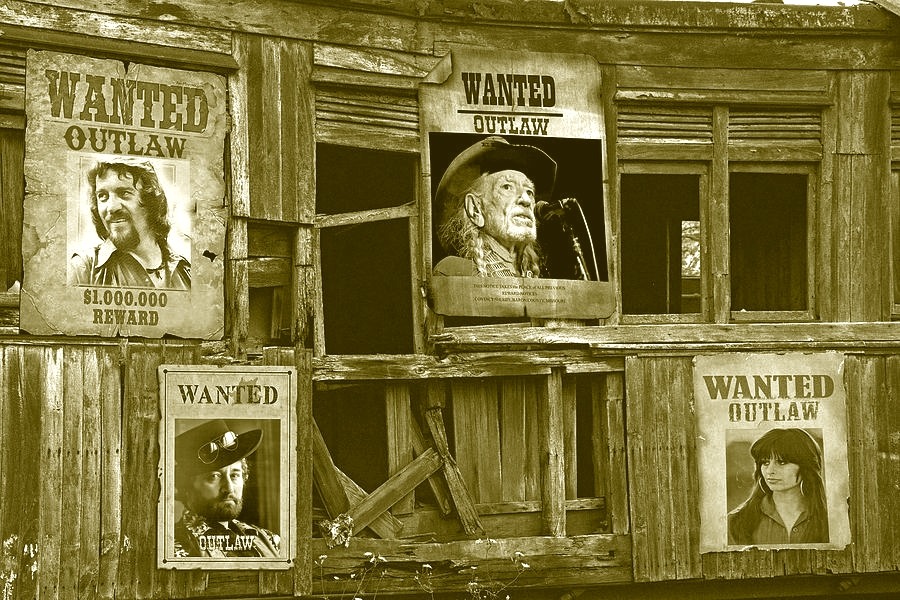
By Jaz Mckay
On November 25th, 1976, a groundbreaking moment in Outlaw Country Music History unfolded as the album “Wanted: The Outlaws,” featuring Waylon Jennings, Willie Nelson, Tompall Glaser, and Jessi Colter, achieved a remarkable milestone. With the new platinum certification, symbolizing one million units sold, it marked a historic day, cementing its place as the first country album to reach such heights and forever leaving an indelible mark on the genre.
Wanted! The Outlaws stands as a shining testament to the harmonious fusion of progressive country music and innovative marketing strategies. Released on January 12, 1976, this remarkable collaboration between Waylon Jennings, Willie Nelson, Jessi Colter, and Tompall Glaser showcased the seamless blend of seemingly divergent elements. The album soared to No. 1 on the country charts and reached No. 10 on the pop charts, solidifying its status as a crossover sensation. Moreover, it etched its place in the annals of music history by becoming the first country album to achieve the prestigious Platinum certification, denoting sales of one million copies. Wanted! The Outlaws remains an enduring symbol of influence and trailblazing within the country music landscape.
As we take a moment to delve into the rich tapestry of this historic recording, Wanted! The Outlaws, let’s uncover its captivating background, iconic hit singles, and the enduring legacy that continues to resonate with listeners across the decades.
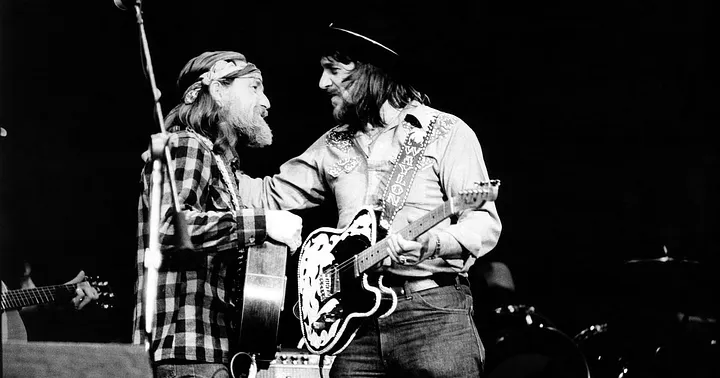
The album emerged as a true masterpiece, showcasing the innovative fusion of their talents, blending traditional country roots with a rebellious edge that captivated audiences far and wide.
The album’s success was propelled by its unforgettable hit singles, which left an indelible mark on the music scene. Songs like “My Heroes Have Always Been Cowboys” by Willie Nelson and “Suspicious Minds” by Waylon Jennings and Jessi Colter became anthems of the outlaw movement, resonating with listeners who connected deeply with their raw honesty and heartfelt performances.
Decades later, the legacy of Wanted! The Outlaws remains vibrant and influential. It solidified the outlaw country subgenre as a force to be reckoned with, inspiring countless artists to push boundaries and embrace their artistic independence. The album’s impact transcended the country music realm, leaving an imprint on popular culture as a whole.
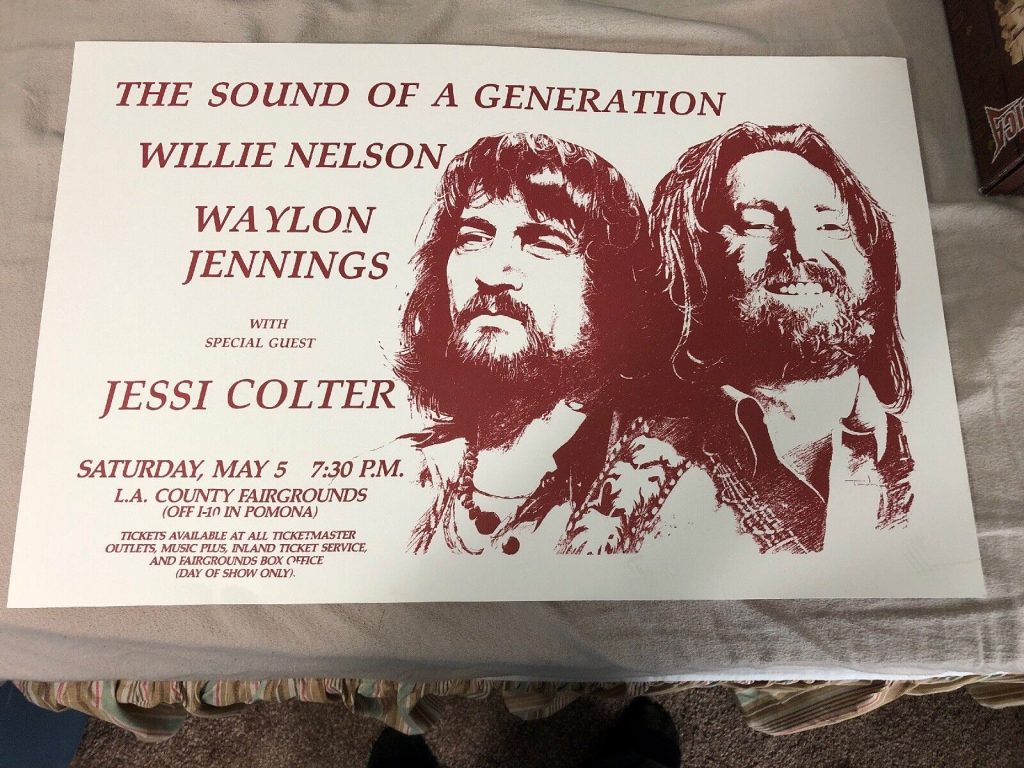
Today we celebrate the timeless music, artistic camaraderie, and the enduring spirit of rebellion that continue to shape the landscape of country music, reminding us of its power to captivate hearts and minds for generations to come.
THE “OUTLAW” DAYS
In the vibrant landscape of 1970s country music, the “Outlaw” movement emerged as a defiant force, shaking the foundations of the genre with a rebellious spirit. A reaction to the formulaic and pop-influenced Nashville Sound, Outlaw country drew inspiration from diverse genres like rockabilly, honky-tonk, rock, and traditional country, forging a progressive sound and a maverick, rock ‘n’ roll attitude.
Outlaw music began to resonate with a new audience, comprising individuals who had not traditionally been fans of the genre. This marked the arrival of the outlaw movement, a transformative force in country music. The movement gained further momentum with the contributions of Nelson’s fellow Austin pickers, including Jerry Jeff Walker, Townes Van Zandt, and Guy Clark and fueled by the songwriting prowess of artists like Billy Joe Shaver, Mickey Newbury, Steve Young, and Gary P. Nunn, and received support from established Nashville stars such as Kris Kristofferson, Bobby Bare, and Johnny Cash. Together, these artists propelled the outlaw movement forward, reshaping the landscape of country music and attracting a diverse range of listeners.

Other leaders in this revolution were such iconic figures such as Charlie Daniels, and David Allan Coe, who challenged mainstream conventions and spearheaded the charge against the industry’s restrictive practices.
Tanya Tucker, Marshall Chapman and Jessi Colter, who adopted her stage name from a reputed Jesse James accomplice, stood as some of the few prominent female voices within the outlaw genre.
Jennings’ landmark album, Honky Tonk Heroes, released in 1973, is widely regarded as the pioneering work of the Outlaw movement. It paved the way for Nelson’s groundbreaking concept album, Red Headed Stranger, and inspired a wave of artists who sought creative control over their music. The term “Outlaw” became a rallying cry, symbolizing the pursuit of artistic freedom and a rejection of industry constraints.
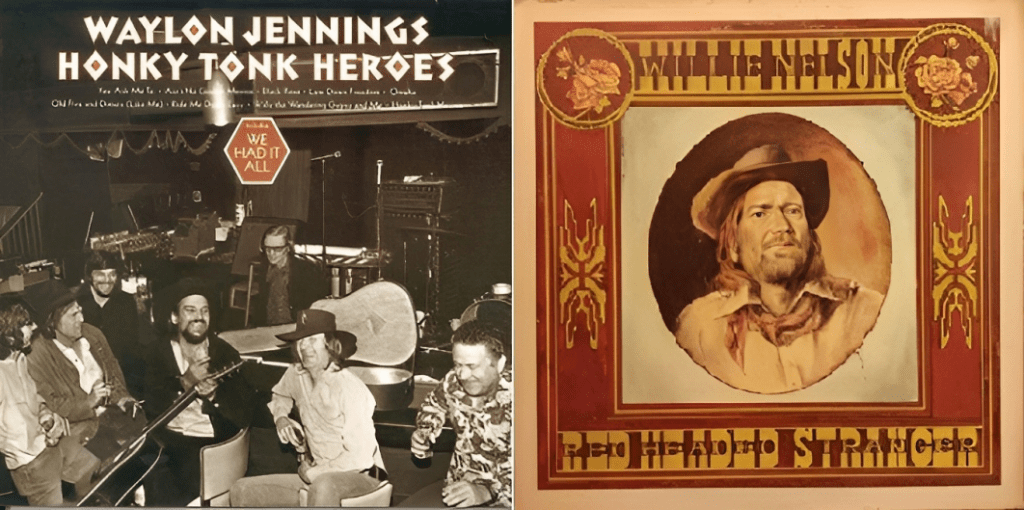
To Jennings, Nelson, and their peers, being an outlaw meant asserting their rights and embracing their unique approaches to music. It became a powerful descriptor for their distinct sound and independent ethos. As Jennings eloquently stated in his autobiography, “For us, ‘outlaw’ meant standing up for your rights, your own way of doing things. It felt like a different music, and ‘outlaw’ was as good a description as any.”
The Outlaw movement not only reshaped the country music landscape but also ignited a revolution that championed artistic autonomy, authenticity, and a bold departure from the status quo. Its impact continues to reverberate through the annals of music history, leaving an enduring legacy of creative liberation and unapologetic individuality.
SHAPING THE ALBUM
The Outlaw movement was causing quite a stir in the industry, and RCA Records saw an opportunity to capitalize on its popularity. A producer named Jerry Bradley approached Waylon Jennings with the idea of compiling his recordings along with some of Willie Nelson’s songs to create an album called Wanted! The Outlaws. Although Jennings personally disliked the “Outlaw” label, he recognized its edgy marketing appeal and gave his approval to the project on the condition that his friend Tompall Glaser would be included and the project’s new tracks recorded at Glaser’s studios, Hillbilly Central in Nashville.
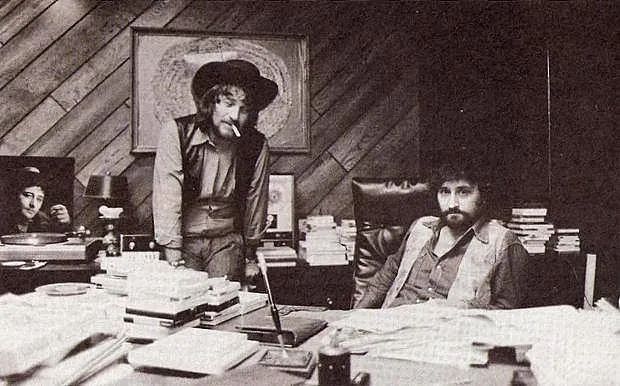
Wanted! The Outlaws primarily consisted of previously released material, carefully selected to align with the prevailing “outlaw” theme. The album opened with the introspective and melancholic track “My Heroes Have Always Been Cowboys,” a notable success for songwriter Sharon Vaughn. Jennings performed a solo rendition for the Outlaws record, while Nelson later scored a No. 1 hit with it in 1980 after releasing it as a single.
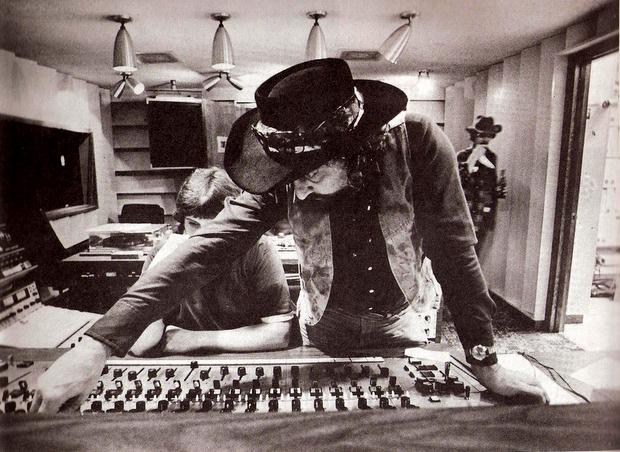
Undoubtedly, the standout track from the album was the raucous “Good Hearted Woman.” Jennings had originally released it as a single in 1972, but this time, he and Nelson joined forces for a duet. However, it’s worth noting that they were never physically together during the recording process. Jennings took his live concert version of the song from 1975 and remixed it, incorporating Nelson’s vocals and adding canned audience applause to enhance the illusion of a “live” atmosphere. The result was a chart-topping success, reaching No. 1 on the country charts for three weeks and an impressive No. 25 on the pop charts. It also earned the prestigious CMA Single of the Year award.
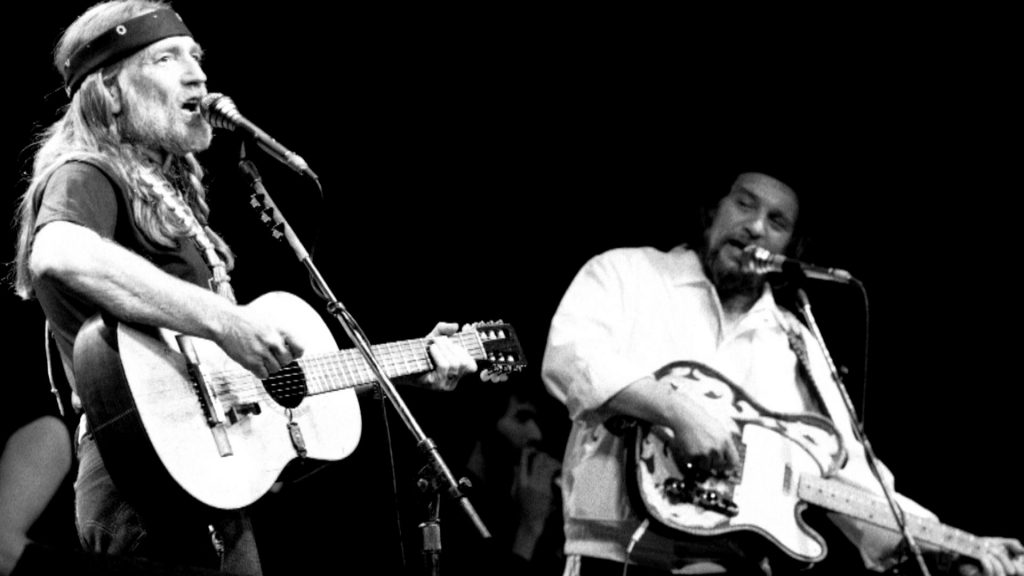
Jennings and Colter achieved another hit from the album with their duet rendition of “Suspicious Minds,” a song famously associated with Elvis Presley. Their version reached the No. 2 spot on the charts. Other notable tracks on the album included Glaser’s tribute to the legendary Jimmie Rodgers with “T for Texas” and Nelson’s reflective “Yesterday’s Wine,” the title track from his 1971 album. Jennings continued the “outlaw” concept by delivering a powerful performance of Billy Joe Shaver’s “Honky Tonk Heroes.”
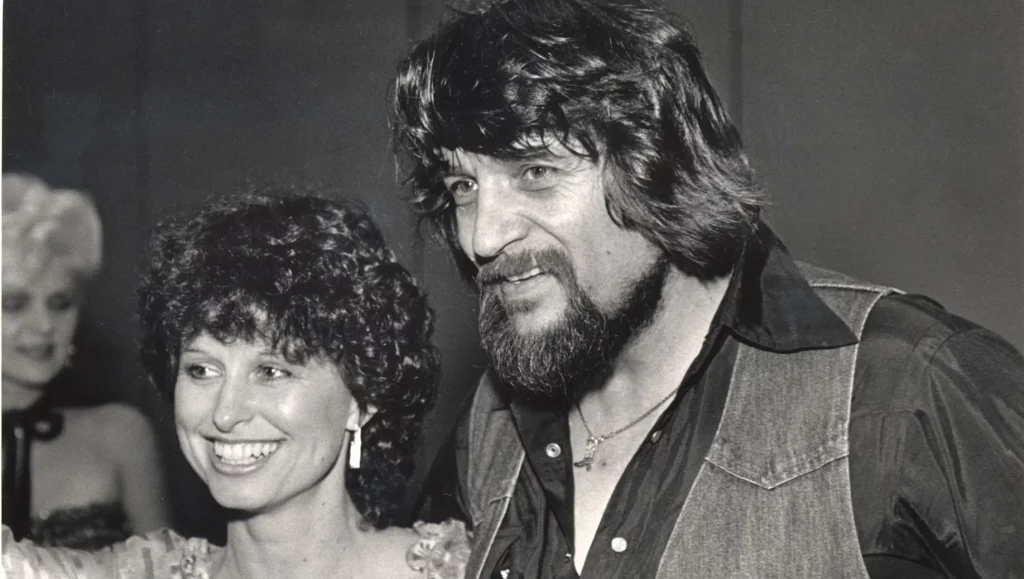
Wanted! The Outlaws captured the essence of the Outlaw movement, resonating with listeners who embraced its rebellious spirit. The album’s success solidified the prominence of Jennings, Nelson, and their peers, leaving an indelible mark on the country music landscape and further establishing the Outlaw genre as a potent force within the industry.
THE RESULT
Wanted! The Outlaws became a powerful symbol of country music’s “progressive” movement, serving as a harbinger of an impending musical revolution that was brewing on the fringes. The album’s cowboy-themed cover, designed to mimic a Wild West Wanted poster, projected a cooler and more contemporary image of country music to the masses. Waylon Jennings, Willie Nelson, and Tompall Glaser, with their long hair, beards, and defiant expressions, defied the conventional image of country artists, appealing to a generation raised on rebellion and rock music. The record captivated both devoted country fans and die-hard rockers who may have once sworn that buying a country album would only happen when Hell froze over.
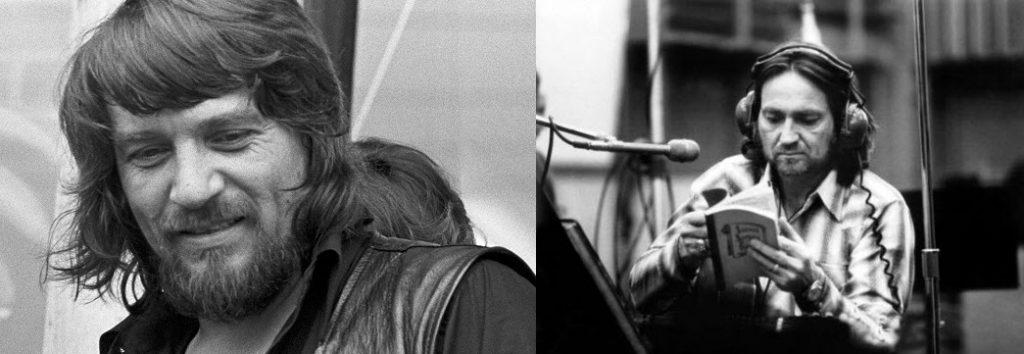
“Everybody rushed out to buy the ‘Outlaws’ album – rock and rollers, kids, people who’d never bought a country album in their whole lives bought that album,” remarked Glaser in the book Willie. Author Michael Streissguth, in his book Outlaw: Waylon, Willie, Kris, and the Renegades of Nashville, noted, “Like Red Headed Stranger, the album tapped into America’s ongoing love affair with the western outlaw as well as each artist’s growing stature in the music community.”
Ultimately, Wanted: The Outlaws emerged as an undeniable sensation, making a significant impact on both the country and pop charts. The album soared to the top of the country charts and even reached an impressive #10 position on the pop charts. In fact, Wanted: The Outlaws marked a major milestone, becoming the first country album to sell over a million copies in a single year, solidifying its place in music history and cementing the outlaw movement’s enduring legacy.
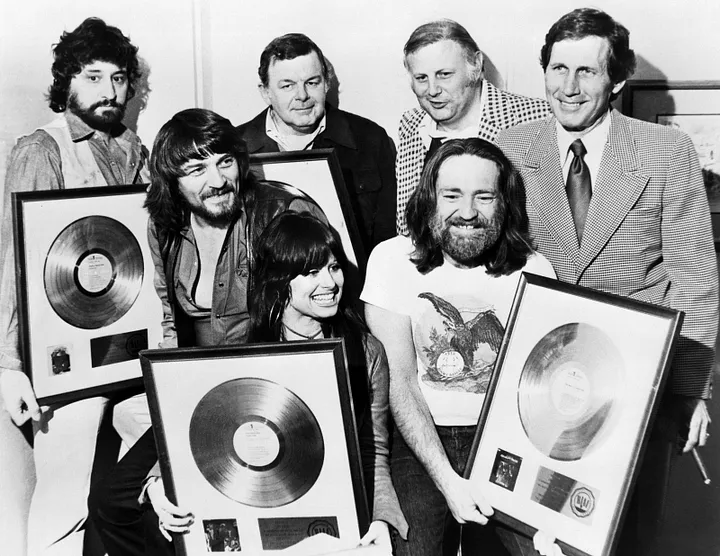
It quickly became evident that this record, featuring the distinctive contributions of four talented individuals, would serve as a defining moment for the outlaw movement within the broader music community. Being an outlaw suddenly became the epitome of cool. But it was more than that, it was freedom, artistic freedom and freedom is contagious. Soon artists like Johnny Paycheck, and Hank Williams Jr. followed suit, proudly donning the outlaw mantle and taking more control over their careers and crafting their own path.
While Waylon Jennings and Willie Nelson occasionally expressed reservations about the “outlaw” label, in the eyes of the public, they had become synonymous with the term. They had fearlessly challenged the Nashville establishment and emerged victorious, forever transforming the landscape of country music. Their remarkable success would reshape and redefine the genre for years to come.
Hear “WANTED: THE OUTLAWS”